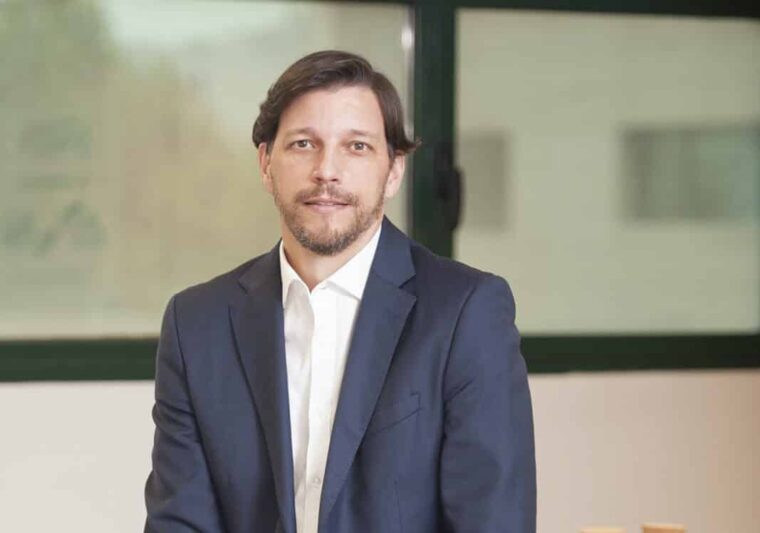Portuguese people who stand out abroad are helping to find out where the business opportunities are and what kind of companies and activities the country can attract. An initiative that brings together Negócios and the Portuguese Diaspora Council.
1. What prompted you to leave Portugal?
Ever since I completed the Erasmus programme (six months in France), I was clear that I would like to work abroad at some point in my career. In addition, once I had reached a general management position in the company I was in at the time – BNP Paribas Personal Finance Portugal – it also became clear that in order to continue developing within the group I would have to leave for a position abroad.
2. What advantages or disadvantages has being Portuguese brought you?
With apologies in advance for some generalisations that may not apply to all cases, I believe that as Portuguese we have three characteristics that define us very much: 1) the ability to integrate into different contexts, and here our ability to speak foreign languages helps enormously; 2) the ability to improvise and stay focused, even when there is no solid, structured base to work from; and 3) a certain excess of formalism in professional relationships.
I believe that the first two are clearly an advantage, which also sets us apart in a very positive way. When I was still in Portugal, I was told an anecdote that I still remember today about a Japanese architect who, after constructing a building in Porto, said that in the future he would always like to have a glass room on his building sites with a group of Portuguese workers, with a “break in case of emergency” sign on it.
The third, I believe, is a clear disadvantage. To use a very illustrative form, I believe that the treatment by “dr.” and “eng.” costs us many euros a year in our GDP and slows down our growth.
3. What obstacles did you have to overcome and how did you do it?
Moving with my family – my wife and our two daughters – to another country, even though it’s in Europe, always comes with some obstacles, especially on a personal level. The fact that my wife had to stop working was one of them. Moving to an international English school for our daughters, who were nine and six respectively when we left Portugal, was another. But in retrospect, it was a change that gave them a global, multicultural vision and an educational base that will certainly help them a lot in their future professional lives.
On a professional level, managing people and businesses in a very different cultural context also requires a lot of learning and a reasonable dose of humility, something fundamental that I also think the Portuguese have innately.
4. What do you admire most about the country you’re in?
After travelling through France and the UK, I’ve now been in Madrid, Spain, for three years. Apart from the gastronomy and the “movida madrilena”, something that as neighbours we’ve known for a long time, what I really admire about the way of working in Spain is the pragmatism and informality of professional relationships.
The former means that relations between organisations are always focused on the business, on moving forward quickly and not wasting too much time on minor aspects. I believe that this mentality has contributed to Spanish companies being well represented in the rankings of the world’s largest companies in different sectors of activity. The prioritisation of industrial projects (such as car and battery production) and the maintenance of tax advantages for non-residents are also good examples.
The second aspect, the informality of relations, contrasts with the less positive aspect of Portuguese culture. The generalised treatment by “tu” from the first contact contributes to better and more fluid collaboration between people in the same company and a closer relationship with clients/partners and suppliers.
5. What do you admire most about your company/organisation?
The BNP Paribas group is part of the financial sector and is one of the most important players not only in Europe but also worldwide. What I have learnt to value most is the diversity of businesses and the opportunities for professional development.
The varied mix of activities allows it to absorb very effectively the different shocks to which a financial group of this size is always subject: macroeconomic, regulatory or of a global nature, as we have seen in the pandemic. With a significant presence in the areas of investment and commercial banking, specialised financing, insurance and real estate, to name but a few, it also manages to generate a lot of synergies between the different areas and provide a fantastic value offer for customers.
6. What recommendations would you give to Portugal and its entrepreneurs and managers?
Before moving on to recommendations, I’d like to start by praising entrepreneurs: I really admire their courage and entrepreneurial spirit. What my experience tells me is that looking outwards is the only way to improve our performance as individuals and managers. This means analysing the competition and the markets within our sector and our country, but also outside our borders and in areas completely different from our own. The day-to-day experiences customers have with the different products and companies they interact with have a huge influence on their expectations of service, even in different sectors or countries.
In the same way, we need to keep learning. Ensure that we train in areas that are relevant to our development as managers; develop networking contacts with people in our sector, but also with people who are different from us, who think and work differently. This helps us break out of the box, come up with new ideas or new solutions to old problems.
Ultimately, it’s something we’ll have to learn to do better and work together. I think the footwear industry has given us a great example with the creation of a centre of excellence, with several companies collaborating to exploit the potential of the international market. Portugal will always be big for us, but very small on the global market, so collaboration, so international sector collaboration between normally competing companies has much more to gain than to lose.
7. In which sectors of the country where you live can Portuguese companies find clients?
In recent months there have been some interesting moves by Portuguese companies to expand into Spain. Within the sector in which I move most professionally – the automotive sector – in addition to the experience of the Salvador Caetano Group and Galp, I am very pleased to see Powerdot’s development plans in the field of electric car chargers. Sustainable mobility is clearly an area of great potential, where Portugal is one of the best examples in Europe.
Outside of this sector, the experience of Sograope in the wine sector, a key economic sector in Spain, or Bondalti in the chemical sector, are other good recent examples of the development of Portuguese companies in Spain. Other sectors that I see with significant growth potential would be bio-pharma, components for the automotive sector, especially in the area of batteries, and the more traditional energy, health and tourism, because they will continue to be areas of great internal and external demand.
8. What sectors in Portugal might companies from the country you’re in want to invest in?
Here too there are many success stories for Spanish companies. Firstly, in the financial sector, with a very large proportion of Spanish banks, but also in agriculture, energy, tourism, construction, etc. In fact, due to its geographical proximity and the difference in size between the two markets, Spain is already very present in the Portuguese economy.
9. What competitive advantage does your country have that could be replicated in Portugal?
Greater support for companies wishing to set up or develop new investment projects in the country. I believe that the pragmatism I’ve already alluded to in this interview has contributed to Spain gaining quite a few places in the industrialisation rankings, something particularly important for a country with an excessive dependence on tourism, such as Portugal.
10. Are you thinking of moving back to Portugal? Why?
Clearly, yes. Apart from the presence of family and friends, I believe that the quality of life is difficult to compare, especially when you think about retirement.
However, it will be difficult to return in the next few years, because potential career projects will probably involve a presence abroad. Eventually, an international position based in Portugal would be a possibility… but it would help to have a better airport, something I haven’t given up hope of seeing built before I retire, hoping I’ll be healthy enough to get there.







